Unicef helps residents replace birth certificates lost due to ‘Yolanda’
GUIUAN, Eastern Samar — One year after Supertyphoon “Yolanda”, Unicef is promoting long-term resilience efforts by the government through replacement of birth registration documents that have been lost or destroyed during the typhoon. Done in partnership with the Department of Social Welfare and Development, this will benefit the most vulnerable children in Eastern and Western Samar and Leyte where Yolanda first made landfall.
The Access to Benefits and Claims after Disaster Expansion programme (ABCDE) implemented through NGO partner Initiatives for Dialogue and Empowerment through Alternative Legal Services (IDEALS, Inc.) will assist around 80,000 individuals from 20 municipalities to secure civil records and other legal documents to reestablish their civil identities.
In addition, 8,000 people from the most vulnerable groups will also be provided with legal documentation services allowing them to access public services, such as pension schemes, education, burial, social security, access to employment and other basic social services. Local government units will be equipped to provide registration services and target populations will also be sensitized on why it is important to obtain birth certificates.
“A name and nationality is every child’s right, as enshrined in the Convention on the Rights of the Child. Every Filipino child, including those impacted by disasters, has the right to be registered at birth and to be provided with birth registration documents that have been lost or destroyed. This is why Unicef is in partnership with the Government to ensure that Yolanda-affected children claim their right to a name and a nationality as part of larger resilience efforts,” Lotta Sylwander, Unicef Philippines representative said.
In the Philippines, there are an estimated 5.3 million unregistered Filipinos, including 2.6 million children. Though the birth registration rate in the Philippines is high at 90 per cent, huge disparities exist between regions, and calamities such as Yolanda lead to the destruction of these critical documents.
It is estimated that at least 50% of households in Western Samar and Leyte experienced loss or destruction of birth certificates and other basic documentation as a result of the typhoon. Around 100,000 people have already requested replacement documentation, but many more cannot afford the transportation and other costs associated.
Article continues after this advertisementChildren who do not have birth certificates may be denied health care or education. The lack of official identification documents makes it more difficult to uphold laws to prevent early marriage, child labour or child recruitment in the armed forces. In adulthood, birth certificates may be required to obtain social assistance or a job in the formal sector, to buy or prove the right to inherit property, to vote and to obtain a passport. Registering children at birth is the first step in securing their recognition before the law, safeguarding their rights, and ensuring that any violation of these rights does not go unnoticed.
Universal birth registration is also part of a system of vital statistics, which is essential for sound economic and social planning. Undocumented children become invisible in society and are at greater risk of exclusion from development plans. This adversely impacts government policies and national development as a whole. Birth registration is therefore is not only a fundamental human right, but also a key to ensuring the fulfilment of other rights.
